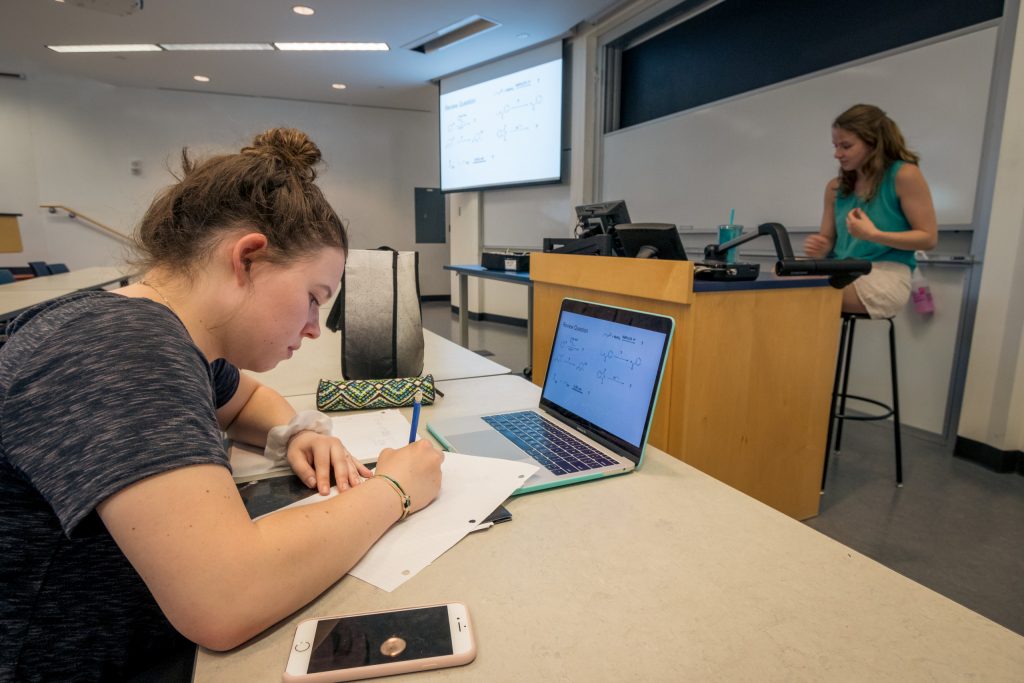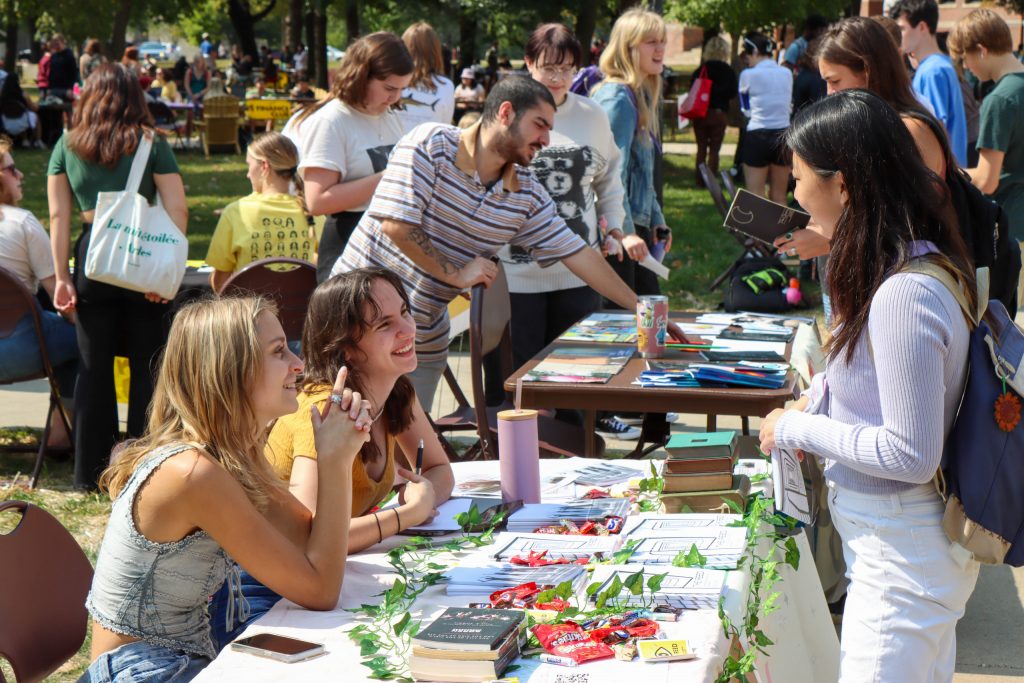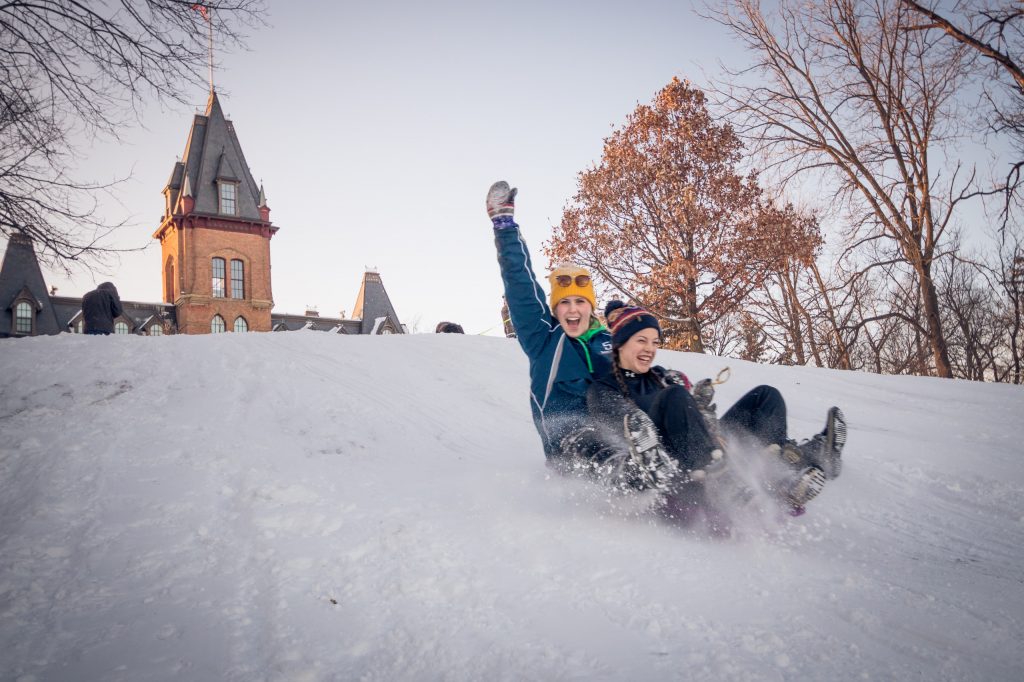October
Welcome to the October 2023 edition of the Parents and Families newsletter!
Academic Success Center Updates
Most St. Olaf students use academic success services:
- 95% of students utilize Academic Success services before they graduate
- Two-thirds of students use Academic Success services each year
- 70% of first-year students attend Supplemental Instruction (SI)
Academic support is available at no additional cost!

Studying in college typically requires students to be more collaborative in their approach to learning. At the same time, students need to be more independent in managing their time and their approach to studying. The Academic Success Center has resources to help.
Services range from the Writing Desk, which provides support to all St. Olaf students at any point in the writing process (even brainstorming how to get started), to more individualized services such as academic subject tutoring, success coaching, and multilingual student support. Supplemental Instruction (SI) gives students a group learning opportunity to engage with course content and learn new study and learning strategies.
The Academic Success Center is dedicated to ensuring equal access to educational opportunities, and the inclusion of all students with disabilities at St. Olaf College. Disability and Access services assist Oles who have temporary or permanent physical, learning, sensory, health, or psychological disabilities.
First-Year students will be attending five St. Olaf Orientation to Academics and Resources (SOAR) sessions throughout the semester to assist them in their transition to college. In September, SOAR sessions covered campus resources, stress management, loneliness, and time management. In October, students learn how to prepare for their advising meeting for registration.
To learn more about all of the Academic Success Center’s services, visit their website.
Registration Details
Written by Lily Moreschi ’24. Lily is a Dance and Quantitative Economics major from Virginia and works as a Student Specialist in Alumni and Parent Relations.
Even though the semester seems to have only just begun, it is already time for your Ole to start thinking about registration for January Term (formerly known as Interim Term) and Spring Semester. Here are some important information and dates for your Ole to know in the upcoming weeks.
Monday, October 2
Student registration holds will be added to their Student Information System (SIS) account. Holds are required housekeeping items for your student to complete. Most of them are short forms such as confirming enrollment intent and reviewing emergency contact information. The most important holds are about academic advising. Your Ole should be sure to complete the academic advising form and keep an eye out for contact from their academic advisor to set up a meeting. All Oles must meet with their academic advisor in order to register for the next semester.
Tuesday, October 12
Your Ole will receive an email from the registrar with logistics about registration. The registration system will be available for viewing so that students can begin planning their schedules and creating wish lists. In addition, your Ole may submit prerequisite overrides beginning this day. Some majors also have pre-registration for select classes. Some majors also have pre-registration for select classes. If applicable, your Ole will receive an email directly from their major’s department around this time.
Monday, October 23–Friday, October 27
Quiet Week for academic advising appointments.
Monday, October 30–Friday, November 3
Registration begins! It will remain open until the second day of classes each term. All times listed are Central time. You should encourage their Ole to register right when their time window opens. Certain classes can fill up fast! Your Ole’s registration day and time will be listed at the top of the registration page when they click January Term or Spring Registration in SIS.
- Monday: All classes register for January Term classes at their designated time.
- Tuesday: Class of 2024 registers for Spring Semester
- Wednesday: Class of 2025 registers for Spring Semester
- Thursday: Class of 2026 registers for Spring Semester
- Friday: Class of 2027 registers for Spring Semester
The best way to support your Ole during registration season is to encourage them to watch their email, plan (and have a backup plan) for the rest of the school year, and set an alarm for their registration time!
Additional information can be found on the Registrar’s Office website.
Here for the Hill: Student Organization Fundraiser
Support your student’s organizations on campus with the Here for the Hill campaign, running October 24–27.

Student organizations are a huge part of the St. Olaf Experience. They provide leadership opportunities, physical outlets, technical skill building, and community building for Oles on and off the Hill. The St. Olaf Fund knows how important student involvement can be — so they are once again hosting the Here for the Hill campaign to enhance and highlight Ole’s passions.
From noon on October 24 to noon on October 27, some of our student organizations will ask you to make a gift to help them achieve their goals and impact fellow Oles. You can make an impact by giving to the Co-Curricular Opportunity Fund, which is designed to help Oles join and fully participate in student organizations without a financial barrier to do so. Matching dollars will be available, and students need your help to unlock more possibilities for Oles — 100% of your gift will go to the organization you choose.
The St. Olaf Fund is also offering a few bonus dollars to help them along the way:
The organization with the largest number of gifts:
- $500 – 1st place
- $250 – 2nd place
- $100 – 3rd place
The organization with the largest number of dollars:
- $500 – 1st place
- $250 – 2nd Place
- $100 – 3rd Place
Show your student’s favorite organizations some love and support them during Here for the Hill October 24—27.
Getting the most out of winter
If your student is moving to St. Olaf College from a warm climate, you may be wondering how they will adjust to the cold winters. The good news is that there are many fun and healthy ways to enjoy the winter outdoors. Here are a few ideas you could suggest to your Ole:
- Try winter sports. St. Olaf has a variety of winter sports clubs, including hockey, skiing, and snowboarding. Even if you’re not interested in competing, you can still enjoy these activities for fun. The St. Olaf Outdoor Recreation Program (STORP) offers rental gear and lessons for students who are new to winter sports.
- Go for a hike. St. Olaf has a beautiful 430-acre Natural Lands preserve, which is perfect for hiking, even in the winter. Just be sure to dress warmly and wear appropriate footwear.
- Build a snow sculpture or snow fort. This is a classic winter activity that’s fun for all ages. Get your friends together and have a competition to see who can build the best snow creations!
- Go ice skating. The St. Olaf campus has an indoor ice rink that’s open to students. Ice skating is a great way to get some exercise and have fun at the same time.
- Go sledding. Sledding is another classic winter activity that’s fun for all ages. Find a hill on campus and let loose! Did you know that St. Olaf College became one of the first U.S. colleges to offer competitive ski jumping with the erection of a 25-foot wooden ski jump in 1911 behind Thorson Hall!?
- Have a winter bonfire. Build a bonfire on campus and roast marshmallows with your friends. It’s a great way to stay warm and have some fun on a cold winter night. Student Activities hosts several Friday Fires on the Buntrock Plaza throughout the year and the Thorson Hall fire pit can be reserved as well.

If your student would rather stay inside, here are a few ideas:
- Go to the library. The St. Olaf library is a great place to study, relax, or find a good book to read.
- Take in the arts. St. Olaf has a vibrant arts scene, with regular concerts, plays, and art exhibitions. There are also several museums in the area, including the Northfield Arts Guild and the Defeat of Jesse James Days Museum.
- Go to a movie. St. Olaf has a movie theater that shows both new and classic films. Students can get $5 tickets to see movies at the movie theatre in Dundas at the Office of Student Activities in Buntrock Commons.
- Go bowling. The bowling alley is located just a short drive from campus.
Here are some general tips for parents to make sure your student has a great winter on the Hill:
- Make sure your student has appropriate clothing. Minnesota winters can be very cold, so it’s important to have a warm coat, hat, gloves, scarf, and boots. Each year the typical risk of frost, or colder weather, is October 2 through May 1.
- Encourage your student to be active. Getting exercise is a great way to stay warm and healthy in the winter.
- Remind your student to stay hydrated and wear sunscreen on exposed skin. It’s important to drink plenty of fluids, even in the winter. Additionally, the winter sun can reflect off the snow and intensify exposure. Sunscreen is not just for the summer in Minnesota!
Most importantly, stay connected to your student. Moving to a new place can be difficult, especially during the winter with shorter days and longer nights. But with a little planning, your student can enjoy all that winter has to offer at St. Olaf College.
Reframing bad news in a positive way
Bad news is a part of life. Everyone experiences it at some point. However, the way we react to bad news can make a big difference in how we cope with it and move on.
At St. Olaf, learning and growing is part of the college experience, even if it comes as a result of bad news. One way to help students deal with bad news is to help them positively reframe it. This means finding a way to look at the situation in a more positive light. Whether it is a poor grade, not getting into the class or dorm they wanted or being declined for an internship, reframing the experience can be helpful.
Here are a few tips you can use to help your student positively reframe bad news:
- Acknowledge your feelings. It’s important to allow yourself to feel your emotions, even if they are negative. Don’t try to bottle them up or pretend that you’re not upset.
- Take some time to process the news. Once you’ve had a chance to feel your emotions, take some time to process the news. This may involve thinking about what it means for you, talking to someone you trust, or writing in a journal.
- Look for the silver lining. Even in the worst situations, there is usually something positive to find. It may be something small, but it’s important to focus on the good things.
- Learn from the experience. Bad news can be an opportunity for growth and learning. Think about what you can learn from the situation and how you can apply those lessons to your life moving forward.
- Focus on what you can control. It’s important to remember that you can only control your own thoughts, feelings, and actions. Focus on the things that you can control and let go of the things that you can’t.
Here are a few examples of how to positively reframe bad news:
- If you don’t get a job you applied for: Instead of thinking about all the negative things, focus on the opportunities that this new situation presents. You may have the chance to find a new job that you’re even more passionate about.
- Instead of saying: “I didn’t get the job.”
- Say: “I didn’t get the job, but I learned a lot from the interview process. I’m going to use that knowledge to improve my chances of getting the next job I apply for.”
- If you get a bad grade on a test: Instead of beating yourself up, think about what you can do to improve your next grade. Talk to your professor or tutor for help.
- Instead of saying: “I don’t get it and I never will.”
- Say: “It’s not the grade I was hoping for but now I know what I need to work on and will prioritize getting help from my professor/tutor.”
- If you have to break up with your partner: Instead of dwelling on the sadness and anger, focus on the positive relationships you have in your life. You may have more time for yourself and others.
- Instead of saying: “My relationship is over.”
- Say: “My relationship is over, but I’m grateful for the time I spent with my partner. I’ve learned a lot about myself and what I want in a relationship. I’m excited to start this new chapter in my life.”
- If you get sick: Instead of focusing on all the things that you can’t do, focus on the things that you can do. Rest up, eat healthy foods, and spend extra time catching up on your to-do list.
- Instead of saying: “I got sick and I can’t do anything.”
- Say: “This is an opportunity to rest and recharge so that I can be more present at my next class.”
It’s important to remember that positive reframing is not about denying the reality of the situation. It’s about finding a way to view the situation that is more hopeful and empowering. When you can positively reframe bad news, you’ll be better able to cope with the situation and move forward in a constructive way.
As a reminder, if your student is struggling and needs additional campus support, campus counselors are available or they can receive FREE 24/7 mental telehealth care on the TimelyCare website or app.